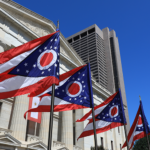After sitting through something like three hours of testimony—not to mention the additional time spent listening to and interacting with protesters on the sidewalk—over the course of two Sequim City Council meetings, it’s fair to say opposition to the labor-reform initiatives proposed for both there and Shelton boils down to a few irrational and easily refuted points.
1. The initiatives are the work of the Freedom Foundation, an evil, out-of-town organization funded by the Koch brothers.
Wrong on all counts. The initiatives are the product of local volunteers who spent countless hours soliciting signatures on the petitions and the hundreds of city residents who signed them. We didn’t pay these people and we have no power to brainwash them.
They did the work because they feel strongly about these reforms, and they’re entitled to see their wishes put to a vote.
The Freedom Foundation is involved for the same reason members of the Green Party, the Communist Party and labor unions from all over Washington with no stake in Sequim or Shelton city government are—because we were asked for help.
We unapologetically support the goals advanced in these initiatives and we’ve provided advice and moral support to the people who’ve done the actual work. But we have neither the resources nor the inclination to impose our will on the Sequim or Shelton communities.
We respect the democratic process and we’ll abide by the election results when the question is finally put to the voters.
Lastly, not that it’s anyone’s business, but we receive absolutely no funding from the Koch brothers. But if we did, we’d be proud to admit it—unlike those who cash checks written by the likes of George Soros and JZ Knight.
2. This is all about union-busting.
Not exactly. It’s about freedom. As the name implies, the Freedom Foundation believes people should have the right to choose whether or not to join a union and fund its activities without losing their job.
If they exercise that right by choosing to stay in the union, so be it. But the unions apparently don’t believe they will or they wouldn’t be fighting so hard to keep that choice from them.
The Freedom Foundation isn’t anti-union per se, but any reasonable person has to question the virtue of an institution that apparently knows it can only exist through coercion and the suppression of individual liberties.
3. America is a democracy, and if the majority of those in a workplace decide union participation should be a condition of employment, their wishes should prevail.
America isn’t a democracy and never has been. It’s a constitutional republic. The difference is that we don’t decide every disagreement by majority vote.
Under the Constitution, each American has certain rights that can’t be abridged no matter how many others disagree with his or her choice. Among these are the rights of free speech and free association, and those rights are trampled when a worker is forced to join a union and/or support its political agenda against his will.
What’s more, most union-certification elections were conducted so long ago that most public workers have never had the opportunity to determine their bargaining representative.
4. If workers don’t want to join or support the union, they have a right to work elsewhere.
That argument might be valid in the private sector, where the employer essentially owns the workplace and can set the terms of employment subject to the demands of its clients and customers.
But the government workplace is owned by everyone, and it’s supported by tax dollars, not profits. Consequently, every American—regardless of union affiliation or political belief—should have an equal shot at a government job if they’re otherwise qualified for it.
Public-sector employers have no more right to discriminate against non-union, non-liberal workers than they do against members of a particular ethnic or racial group.
5. High union wages are good for the community because they enable families to purchase more local goods and services.
This is dumbed-down economics at its finest.
A successful private-sector business is, in fact, a boon to the community for those reasons because it’s bringing outside dollars into the local economy. But highly paid public-sector union members by definition drag down the community’s median income because they force everyone else to pay higher taxes to fund their inflated wages. There are no additional dollars generated; the process simply transfers a larger-than-needed percentage of dollars from the pool of taxpayers to a small number of privileged union workers.
As always, unions are a great deal for members but a bad deal for those who actually generate the wealth it takes to pay their wages and benefits.
Regardless, allowing employees to opt out of paying compulsory union dues has nothing to do with reducing the salaries of public employees. If employees think the union represents them effectively, they’ll gladly pay the dues. But if the union isn’t serving employee interests, why should the workers be forced to pay for its unwanted services?
6. The initiatives single out collective-bargaining negotiations but ignore other transactions in which a city is involved. That proves this is about busting unions, not transparency.
The measures single out collective bargaining because it is specifically exempted from the state’s Open Public Meetings Act. Most other city business is already open to public scrutiny.
7. Labor negotiations should be limited to the affected parties. It’s no one else’s business.
That’s exactly right. What’s unique about public-sector unions is that the general public is an affected party because it’s the taxpayers who foot the bill and receive public services. In no other contract negotiation scenario imaginable would it even be suggested that the party paying the bills be prevented from observing the process.
8. Public employees work hard and they deserve everything they earn.
So do non-unionized employees in both the public and private sectors. The difference is, their compensation is based on real-world market forces like supply and demand and not just pulled out of thin air by politicians spending someone else’s money.
No one is hurt and both parties benefit when an employer pays the lowest wage it can to someone who is perfectly willing and able to provide a needed service at that price. Conversely, when workers are overpaid relative to their real worth in the free market, the person paying that salary is hurt, as are the additional workers who won’t be hired because the employer can no longer afford to.
Only the overpaid worker comes out ahead.
Why should the laws of economics be suspended for unionized workers—especially those paid out of tax revenues rather than profits as a result of behind-closed-door negotiations?
9. Why are you pushing right-to-work and transparency legislation at the local level rather than at the state level?
We’re doing both. We’re capable of multitasking.
10. Bringing outsiders into the process will make negotiating more difficult.
For whom? And in what way?
Union members have every right to expect their leaders to press for the highest wages and best benefits possible. On the other hand, as taxpayers, our expectation is that the city will drive a hard bargain to keep personnel costs—and the taxes required to pay them—to an absolute minimum.
If the negotiations go too smoothly, one side or the other isn’t doing its job. By the same token, if the negotiations are needlessly contentious, one side or the other is being unreasonable.
Either way, the public—and the union members—are entitled to see how they’re being represented.










